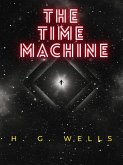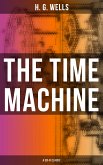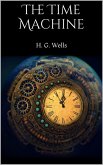The Time Machine - H. G. Wells - The sci-fi novel that actually gave us the term: 'time machine'. The story starts with a narrator telling his dinner guests about the Time Traveller's machine and how it allowed him to travel through the fourth dimension, and how he has built such a machine himself. He returns the following week with a tale of how he has used it and where it took him. He talks of his journey to the year A.D. 802,701, where he finds that the state of the human race has changed considerably, and where he discovered two distinct peoples; the Eloi, and, the Morlocks. He originally believed that they shared a kind of 'Lord/Servant' relationship. However, he soon realised that it was more like that of 'Ranchers/Livestock'. The Time Machine had been adapted into three films, two television versions, and many comic books, as well as being a huge influence in the genre of science fiction. Herbert George Wells (21 September 1866 - 13 August 1946) was an English writer. Prolific in many genres, he wrote dozens of novels, short stories, and works of social commentary, history, satire, biography and autobiography. His work also included two books on recreational war games. Wells is now best remembered for his science fiction novels and is sometimes called the "father of science fiction. During his own lifetime, however, he was most prominent as a forward-looking, even prophetic social critic who devoted his literary talents to the development of a progressive vision on a global scale. A futurist, he wrote a number of utopian works and foresaw the advent of aircraft, tanks, space travel, nuclear weapons, satellite television and something resembling the World Wide Web. His science fiction imagined time travel, alien invasion, invisibility, and biological engineering. Brian Aldiss referred to Wells as the "Shakespeare of science fiction", while American writer Charles Fort referred to him as a "wild talent". Wells rendered his works convincing by instilling commonplace detail alongside a single extraordinary assumption per work - dubbed "Wells's law" - leading Joseph Conrad to hail him in 1898 as "O Realist of the Fantastic!". His most notable science fiction works include The Time Machine (1895), which was his first novel, The Island of Doctor Moreau (1896), The Invisible Man (1897), The War of the Worlds (1898) and the military science fiction The War in the Air (1907). Wells was nominated for the Nobel Prize in Literature four times.
Dieser Download kann aus rechtlichen Gründen nur mit Rechnungsadresse in A, B, BG, CY, CZ, D, DK, EW, E, FIN, F, GR, H, IRL, I, LT, L, LR, M, NL, PL, P, R, S, SLO, SK ausgeliefert werden.









